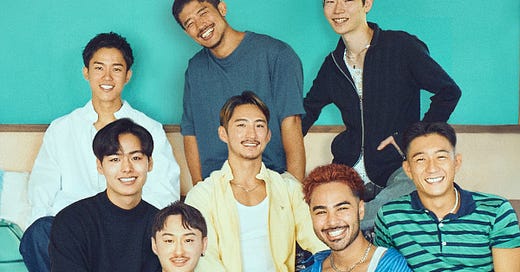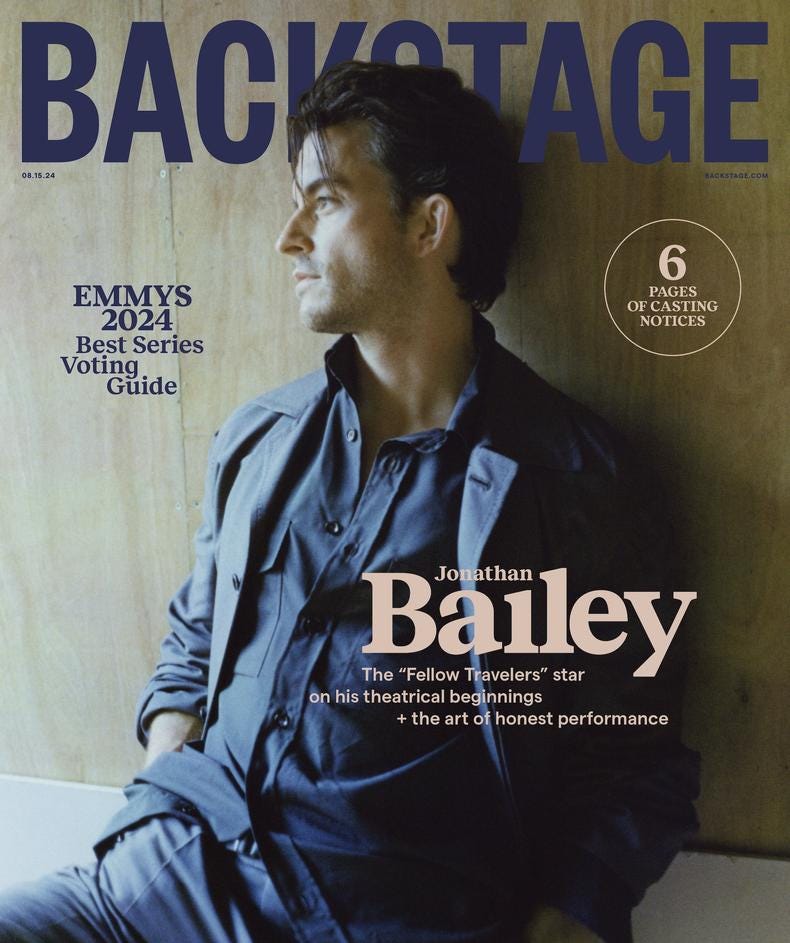I love my emotionally mature gay sons
Netflix's "The Boyfriend" is the antidote to feel-bad reality dating shows
One of my favorite aphorisms: No one who wants to run for president should be the president. That paradox applies to most people who seek power or fame. For example, no one who wants to find love on television should find love on television.
Reality dating shows are not my bag. They’re like Mike’s Hard Lemonade: something I enjoyed in 2009 but that my nervous system has now rejected. I’ve put in the hours, though. I rooted for Tiffany “New York” Pollard on “Flavor of Love.” I watched multiple episodes of “A Shot at Love with Tila Tequila,” which also disqualifies me from the presidency.
“The Bachelor” industrial complex never won me over. The appeal is apparent, and I shan’t trash talk anyone’s trash TV. But there’s a particular artifice and insincerity to the franchise and its contestants that’s made me chafe more as I’ve gotten older.
However, I recently met my match: “The Boyfriend,” a Japanese reality dating show on Netflix. I am Paul traveling the road to Damascus. Bruce Wayne seeing a bat fly through a window. Cruella petting her first Dalmatian. I am now changed. True love exists, and it can be found in a tasteful co-living arrangement with several polite young men.
“The Boyfriend” dropped in July, and all ten episodes are now streaming. The show lets several guys of varied personalities but with only two different haircuts spend a summer together to see if sparks fly.
Mild spoilers for “The Boyfriend” follow, but this show isn’t M. Night Shyamalan or anything. It’s better.
Every detail is crucial to its appeal. The theme song, titled “Dazed & Confused,” is a delirious K-pop lobotomy. The cast’s house, confusingly called the Green Room, looks like an Airbnb owned by a hedge fund in a gentrified neighborhood.
Each episode, the guys take turns pairing off to pull shifts at a coffee truck. In the first episode, they brainstorm a name for the truck, and you really grasp their vibe: very conscientious toward each other, very pure of heart, very smooth of brain. They ultimately name it Brewtiful & U. Nonsensical and adorable, just like earnestly seeking a partner on camera.
But that endeavor feels increasingly possible with each episode, to my delight. Watching international reality shows can (sometimes) put American coarseness in sharp relief. We’ve seen this before with “The Great British Bake Off,” a monument to gentle competition that avoids exploitation. I also watch a lot of American baking shows, especially Food Network’s seasonally themed “Baking Championship” franchise. Let me tell you: If “Bake Off” is Mozart, these stateside analogues are JoJo Siwa. Even at their most innocent, they value drama above all things, except maybe royalty-free music.
Meanwhile, “The Bachelor” shows people punching doors and calling each other fame whores. Contestants cry — histrionically, and often.
Again, to each their own, but I prefer the approach of “The Boyfriend.” Dates or hangs often start with the words, “Let’s have fun together.”
The first conflict on the show arises when the guys — and their keels are so even, mind you — sit down to figure out their grocery budget. They realize that hunky go-go boy Usak has spent half of their funds on chicken breasts, which he blends with water and chugs every day so that his abs will continue to look like a pack of King’s Hawaiian rolls. This becomes a recurring plot line. Give everyone an Emmy.
“In one early scene, they brainstorm a name for the truck, and you really grasp their vibe: very conscientious toward each other, very pure of heart, very smooth of brain.”
Most reality dating shows I’ve seen rely on combustible personalities to produce storylines. “The Boyfriend” actually seems interested in helping its cast find compatible matches, or at least lifelong friends. Hair and makeup artist Gensei has a cute mustache and an unspoken crush on Ryota, a gawky model/barista who perpetually looks like he just woke up. Then there’s extroverted Alan, who hugs every housemate when he meets them and goes to the same hairstylist as Knuckles. He pines openly for chef Kazuto, who is asked on so many coffee shift dates by the boys that he should file a labor complaint.
And I can’t say enough good things about smiley college kid Dai, who spends most of the show trying to parse the feelings of Shun, a moody artist. Shun is my immortal enemy and the person I’d most like to see exiled to space.
You see, Shun is just so moody. Sometimes, it doesn’t seem like he wants to be in the house. He shuns (sorry) Dai’s open affection as clinginess and says he just wants to be friends. Dai agrees with a cheerful grace I do not possess. Shun then immediately tells the camera that now he actually desires Dai. And yet, when the boys cuddle on the couch, he pushes Dai’s hand away. As toxic as the best song Britney Spears ever recorded!
“I think I’m a troublesome person,” Shun confesses in a later episode. I made a throttling gesture with my hands.

This will they/won’t they captivated online fans, of course. I don’t really hate Shun. He’s a necessary narrative foil to the warmth of the show. (He also gets the most harrowing moment of backstory.) I think his antics merely shook me out of a reverie of chicken shakes, coffee trucks, and emotional maturity.
That last one is my favorite thing about “The Boyfriend,” and why I’ve recommended it to several friends. Almost every time the cast members encounter a misunderstanding or vulnerable moment — and they do — they talk it through like adults. They use words. Several guys outright say on camera that they did the show to get better at expressing their feelings. Considering that “The Boyfriend” is Japan’s first same-sex dating show, such interpersonal cogency inspires awe.
No one is more aware of this than 34-year-old Taehon, who isn’t yet out to his parents. He starts many of the shows best conversations about the struggles of queer people. As to whether the series sufficiently uses its platform, Aki Camargo wrote a great essay about that for Joy Sauce.
A show like this would be revolutionary in the U.S., too. Our stabs at LGBTQ reality dating shows have tended toward spectacle, from the aforementioned “A Shot at Love” to “Finding Prince Charming” and “For the Love of DILFs” (which is actually quite fun).
For all the dopamine those shows produce, the warmer approach of “The Boyfriend” spoke to me. There’s been little romance in my own life. My media-poisoned brain can’t help but grasp at possibility through TV. I look at Gensei working up the courage to half-tell Ryota that he likes him, and then I see the wind leave his sails when the message didn’t get across. I nod. Heck, Shun probably annoys me because I recoil at the reflection I see in his inner saboteur.
I still doubt that a casting call is the way to true love. But if I’m going to watch hot people act out an operatic simulation of courtship, I’ll take some sweet dummies every time.
One rad thing
Last week, I went deep into the generationally traumatized world of Charli XCX. I am equally invested in the joint reign of this summer’s other pop princess, Chappell Roan. (Sabrina Carpenter can be the Starbucks shift leader of pop.)
It’s easy to find critical musings about the Roanaissance, but the “Pink Pony Club” singer seems elective with her sit-down interviews. This week, people’s prince Bowen Yang asked her some great questions for Interview. It’s a must-read.
I also enjoyed Roan’s appearance on Drew Afualo’s The Comment Section podcast.
She and Afualo (always a disarming interviewer) compare notes about notoriety and online fandom. Plus, Afualo’s signature high-volume laughs contrast nicely with Roan’s soft-spoken deadpan. She’s like a pop music Maria Bamford. Add it to your queue.
Outbound messages
I keep a comprehensive mental list of how nice celebrities are when I interview them. Tilda Swinton gave me a pep talk about an inch away from my face once.
Jonathan Bailey is Tilda-caliber. When I talked to the “Fellow Travelers” star over Zoom about a month ago, he could not have been more generous — with his thoughts, his time, his feedback and his energy. I interviewed Bailey for a cover profile in Backstage magazine, which you can read now. We covered his recent Emmy nomination, “Bridgerton,” “Wicked,” Patti LuPone, and assorted homosexual topics.
And one last piece of reading material: Texas Monthly’s Amanda O’Donnell, one of my favorite writers and the best head of hair in journalism, wrote a fantastic appreciation of Austin indie-rockers Spoon to mark the 10th anniversary of their album “They Want My Soul.” Amanda can evoke feelings like a fish can swim:
“By the time They Want My Soul came out, in 2014, I was a couple years recovered from adolescence but still vulnerable to what Spoon was offering: the same signature lyricism (both abstract and somehow personally resonant), a familiar sound that was alternately fun and booming and sentimental, and something new—a synth-y undercurrent. A modernity. A youthfulness!”
You can and should read it here.





